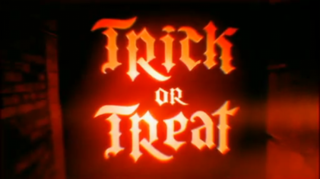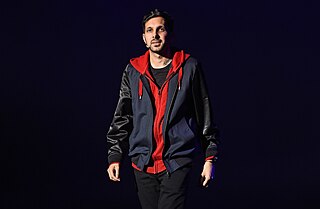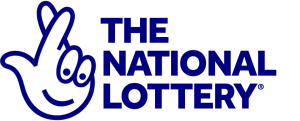
Stonehenge is a prehistoric megalithic structure on Salisbury Plain in Wiltshire, England, two miles (3 km) west of Amesbury. It consists of an outer ring of vertical sarsen standing stones, each around 13 feet (4.0 m) high, seven feet (2.1 m) wide, and weighing around 25 tons, topped by connecting horizontal lintel stones. Inside is a ring of smaller bluestones. Inside these are free-standing trilithons, two bulkier vertical sarsens joined by one lintel. The whole monument, now ruinous, is aligned towards the sunrise on the summer solstice and sunset on the winter solstice. The stones are set within earthworks in the middle of the densest complex of Neolithic and Bronze Age monuments in England, including several hundred tumuli.

Derren Brown is an English entertainer, mentalist, illusionist, and writer. Brown began performing in 1992, making his television debut with Mind Control (2000). He has since starred in several more shows for stage and television, including Something Wicked This Way Comes (2006) and Svengali (2012) which won him two Laurence Olivier Awards for Best Entertainment, as well as The Experiments (2011) which won him a BAFTA for Best Entertainment Programme at the 2012 awards. Brown made his Broadway debut with his 2019 stage show Secret. He has also written books for both magicians and the general public.

The Wisdom of Crowds: Why the Many Are Smarter Than the Few and How Collective Wisdom Shapes Business, Economies, Societies and Nations, published in 2004, is a book written by James Surowiecki about the aggregation of information in groups, resulting in decisions that, he argues, are often better than could have been made by any single member of the group. The book presents numerous case studies and anecdotes to illustrate its argument, and touches on several fields, primarily economics and psychology.
Wintario was the first lottery game offered by the Ontario Lottery Corporation in Ontario, Canada.
Andrew Nyman is an English actor, director, writer and magician. He is the voice of Bag in the children's television show Sarah and Duck.

Trick or Treat is a British television show hosted by Derren Brown produced by Objective Productions and broadcast on Channel 4. The first episode was broadcast on 13 April 2007. The focus of the show is on one person selected from a pool of volunteers who responded to adverts in the national press to take part in the show. The experience the volunteer receives is decided by which card they choose. If they choose the card that says 'Trick' they receive a bad experience and if they choose the card that says 'Treat' they receive a good experience. This distinction is not always obvious, however: in Series 2, a participant's dark experience of being persuaded to (supposedly) kill a kitten was a 'treat' because of the positive attitude to life Derren believed she would consequently develop; similarly, a volunteer who chose a 'trick' was kidnapped, but had been taught escapology techniques which enabled her to easily escape.
Peter "Pete" Firman is an English magician, comedian, television presenter and actor.

Steven Frayne, better known by his former stage name Dynamo, is a British magician born in Bradford, West Yorkshire. His television show Dynamo: Magician Impossible ran from July 2011 to September 2014, and saw him win the Best Entertainment Programme award at the 2012 and 2013 Broadcast Awards. Dynamo has toured the world, and his Seeing Is Believing arena tour was seen by over 750,000 people across the UK, Australia, South Africa and New Zealand.

Cyriak Harris, known mononymously as Cyriak, his B3ta username Mutated Monty, and Mouldy in the Doom community, is an English freelance animator, artist, composer, and author from Brighton. He is known for his surreal and bizarre short web animations with the frequent use of the Droste effect. Cyriak is his real birth name.

The National Lottery is the state-franchised national lottery established in 1994 in the United Kingdom. It is regulated by the Gambling Commission, and is currently operated by Allwyn Entertainment Ltd, who took over from Camelot Group on 1 February 2024.
The Heist is a 2006 British Derren Brown television special that aired on Channel 4. In the special, Brown purports to use the cover of a motivational seminar and documentary to see if he can persuade four members of a group of thirteen businessmen and businesswomen to steal £100,000 in what they believe is a genuine "armed robbery" of a bank's security guard.

Magic, which encompasses the subgenres of illusion, stage magic, and close-up magic, among others, is a performing art in which audiences are entertained by tricks, effects, or illusions of seemingly impossible feats, using natural means. It is to be distinguished from paranormal magic which are effects claimed to be created through supernatural means. It is one of the oldest performing arts in the world.
The National Lottery Results is the television programme that broadcasts the drawing of the National Lottery in the United Kingdom.

Dynamo: Magician Impossible is a fly on the wall documentary series following the life of English magician Steven Frayne, better known as Dynamo. The show is produced by Phil McIntyre Productions and Inner Circle Films for UKTV's channel Watch and Universal Networks International. In 2012, the show was nominated for Best Entertainment Programme at the 17th National Television Awards.

"How to Control the Nation" is the second special in British psychological illusionist Derren Brown's The Events television series. It features Brown playing a short "subliminal film" intended to make viewers who watched the programme unable to stand up from their seats. Although most segments were pre-recorded and showed Brown investigating and performing subliminal techniques, the show was partially broadcast live, and Brown spoke with viewers who had been affected by the film on the telephone.

"How to Be a Psychic Spy" is the third special in British psychological illusionist Derren Brown's The Events television series. In the programme, supposedly as part of an experiment into remote viewing, Brown invited viewers to guess what was painted onto a concealed canvas. He later revealed that he attempted to subliminally influence viewers' choices by placing advertisements in major newspapers instructing them to draw concentric circles.
"How to Take Down a Casino", also called "How to Beat a Casino" or "How to Beat the Casino", is the fourth and final special in British psychological illusionist Derren Brown's The Events television series. The episode featured both live and pre-recorded segments, and showed Brown attempting to win £175,000 by placing money that he had taken from a member of the public on a roulette wheel in an undisclosed European casino.

Objective Media Group (OMG), previously known as Objective Productions, is a media company that produces entertainment, factual entertainment, reality, factual and scripted programming. It has produced shows including The Cube, Lingo, The Gold, Feel Good, Peep Show, Fresh Meat, and Toast of London. The company has offices in London, Manchester, Glasgow, Scotland and Los Angeles, California.

TV's 50 Greatest Magic Tricks is a one-off list show that was produced by Objective Productions for Channel 5. The programme counts down the fifty greatest magic tricks – The Magic Bullet by Penn & Teller is the illusion at number one. The show was presented by the British actress Fay Ripley, and was directed by Helen Albon. TV's 50 Greatest Magic Tricks was first broadcast on Channel 5 on 31 December 2011. The list of magic tricks features set pieces, stunts and rabbit-out-of-the-hat tricks. Contributors to the programme included Penn & Teller, Paul Daniels and Dynamo. Two tricks by the British magician Pete Firman featured in the list, with his Goldfish Trick in the top ten.













